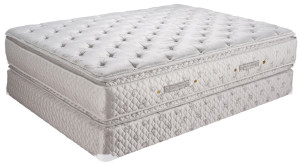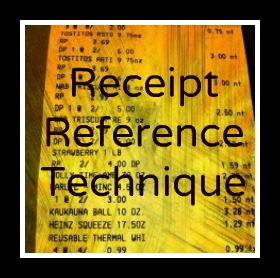Like most people, I treasure sleeping. Not just because it’s relaxing and fun and healthy and necessary but because it’s rare that I actually get a good night’s sleep.
It’s not that I have bad habits causing me to sleep poorly. I don’t watch TV before bed, I have a regular routine, my room is pretty much devoid of light, all my electronics are kept in another part of the house, and I try to keep a decent bedtime. My house is a comfortable temperature and I remember to bring my fuzzy blanket. The dogs even know their places in the bed!
So why do I sleep poorly?

My mattress is a piece of crap.
It didn’t start out that way when we bought it 8+ years ago. It was wonderful back then. But, as we know, mattresses wear out over time (which is probably why it’s suggested to flip them but we have a pillow top so that rules out that plan. Helpful hint: never buy a pillow top mattress. Just don’t) which can lead to a myriad of problems. Including financial ones.
Don’t believe me? Let’s look at a few ways a bad mattress can cost you money beyond forking over hundreds of dollars for a new one:
- Spending money on vices. If you’re like me, you have tendency to spend money when you’re tired. And not just on impulse purchases or unnecessary ones. You spend money on vices like junk food, caffeinated beverages, energy drinks…anything that’ll give you that quick pick-me-up to combat being tired. This happened to me more when I was working an office job. There was no time (or place) for a nap so I had to do whatever was necessary to get through the day. At the end of a week, it was conceivable that I spent around $10 ($2 per day) on junk just to keep me awake and functioning.
- Decreased productivity. Speaking of functioning, when I’m tired, I can barely do anything except the minimum that is required of me. And, some days, I can’t even form a coherent sentence in an email! So I do nothing. Then the unfinished projects start to mount and the ones that are finished are such shit that I can’t let them meet anyone else’s eyes. This is not a great way to earn a living, especially when you’re trying to building a business from the ground up. Poor productivity costs me money, time, and possible clients.
- Forgetfulness. I’ve talked before that I’ve had to automate a bunch of bills due to my mental health issues. And that’s been working out splendidly so far. Not only is it one less task to remember but it makes my life so much easier. Especially when you consider the fact that when I’m tired, I’m very forgetful. I forget to pay bills that are sitting on my desk, I forget to renew library books despite the email reminders, I forget to carefully menu plan and create a grocery list, and I forget to…well, I forget what else I forget. But these things all cost money in fines, late fees, and last minute trips to the store.
- Aches and pains. The worst part about a bad mattress is all the accompanying pain: headaches, back aches, shoulder pain, neck spasms. If you’re never experienced any of this, consider yourself lucky because they fucking hurt. And the only way to manage them on a daily and affordable is to pop pain relievers like ibuprofen. But even that can start to add up if you’re going through a bottle a week. Then there’s the added bonus of needing to go to a chiropractor for adjustments, which comes with its own expenses like co-pays (or total out of pocket cost if your insurance doesn’t cover it), time off from work, gas or other transportation to get there, and any ancillary products you may need to buy (heating pad, etc). What should just be a minor inconvenience has now become a huge expense.
I wish I had a great solution for sleeping on a bad mattress. If you’re like us, you have to manage until you can afford to replace the horrendous one. But, if you’re smarter than us, you’ll do this: have a mattress replacement fund. We all remember to have travel funds, baby expense funds, car repair funds, pet emergency funds. Why not add a mattress replacement fund into the mix. A few dollars a month will ensure that by the time you need a new mattress, you’ll have the money to buy it.
And believe me when I say that the $10 or so a month you’ll put aside is way less expensive in the long run than dealing with the other consequences.


